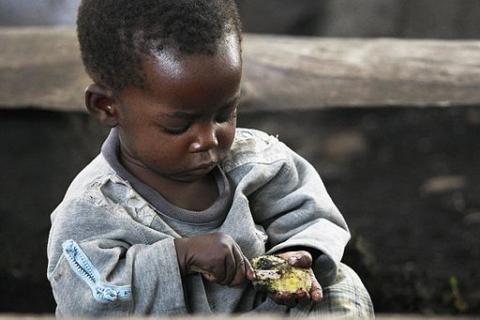
Fr. Ken Thesing, MM, who served in Tanzania and Rome, wrote the following reflection which was published in A Maryknoll Liturgical Year: Reflections on the Readings for Year B, available from Orbis Books.
The followers of Jesus – the disciples as they came to be called – went through a long process of formation as they struggled to understand who Jesus was. They perceived Jesus as clearly human like them, but yet more. Attracted by his teaching and actions among them they felt called to “come and see,” and to follow him. They were constantly called to “see” beyond the human, to grasp what God was doing in their midst.
Our scriptures often use contrasts, like the theme of darkness and light, or as we see in the readings for today’s liturgy, the theme of blindness and sight, to show that process of growth in understanding for the disciples or for anyone who wants to follow Jesus, including those reading the scriptures today. The first reading from Jeremiah recalls a time when after exile and suffering, after oppression and servitude, God brings God’s people back to the land of their ancestors. God leads “a great company” back, “among them the blind and the lame, those with child and those in labor.” These are the people God brings back and restores: not just the strong, the gifted, and those who can pay for assistance, but the frail and vulnerable – no one is left out.
Currently I represent a group of Catholic religious and mission-oriented congregations in Rome at the Food and Agricultural Organization. My role is to voice the experience and witness of these congregations and the people among whom they work as policies are formulated and programs are constructed to ensure that people worldwide have access to good, nutritious and culturally appropriate food. The issues that must be considered and resolved include how to address food insecurity in areas of protracted crises such as armed conflict and where climate change has made the land uninhabitable; how to pay for food in places where vast populations live in rural poverty; how to preserve communal lands in the midst of land grabs; how to protect smallholder family farms from global economic shocks; and how to improve education, extension services, land and credit access for women farmers because in many parts of the world, and particularly in Africa, the majority of farmers are women.
For years my ministry was preaching the Gospel, forming disciples of Jesus among peoples just like those in our scriptural readings today. They were conscious that God was with them on their life journey; that God walks with those who cannot walk alone. But like Bartimaeus in today’s gospel, I think perhaps all of us are looking for a cure for our blindness. In many cases we are looking for someone to simply remove the problems that we face.
Today Jesus uses this instance of giving sight to the blind man to teach his disciples and to teach and remind us that there is more to life than meeting physical needs of health, food and shelter. Jesus hears the cries of Bartimaeus but does not immediately cure him from afar; he asks others to be involved, to bring Bartimaeus to him. It is this involvement that Jesus asks of us – and of Bartimaeus himself, for when he receives his sight he follows Jesus.
There is profound learning for us to see in this gospel story and then to integrate into our lives. Many of those people who were with Jesus on the path that day rebuked Bartimaeus and tried to keep him quiet. They actually were the blind ones; they did not realize that Jesus calls everyone to be disciples, and to imitate him in helping those in need on the way. That is the meaning of discipleship, to be involved now in our own lives imitating the example of Jesus in service to all the blind in body, mind and spirit. In the Gospel today Jesus tells Bartimaeus, “Go, your faith has made you well.” Rather than running off, Bartimaeus remained a disciple with Jesus along the way.
This too is our challenge and the lesson to learn from our scriptures today. In the United States, this is election season, the time of year when we vote for local, state and national leaders. Our challenge will be to exercise our responsibility to work with whomever is elected to ensure that policies and programs are in place to ensure a place for the very people God insisted on including in Jeremiah’s time: “the blind and the lame, those with child and those in labor …,” those who are weak and needy as well as the healthy and strong. No one is excluded. And when those in need in our time and among us call out for help, let us ensure that we do not obstruct them but be mediators and facilitators to bring them to light and healing, to bring them to faith and salvation from misery.
Our scriptures, our Christian faith and our baptismal call all remind us that we will always have the opportunity, like Bartimaeus, to throw of our cloaks of blindness and learn to see God’s universal call to us to build communities of security, of justice and enough for all, to love one another.
Photo of Congolese refugee child by Steve Evans from Citizen of the World/Uploaded by russavia/CC BY 2.0 (http://creativecommons.org/licenses/by/2.0), via Wikimedia Commons
